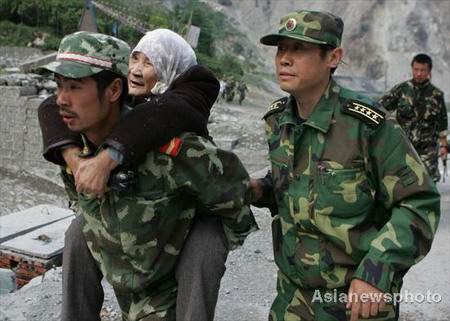Elderly try hard to deal with quake trauma
By Zhu Zhe (China Daily)
Updated: 2008-05-23 06:56
Updated: 2008-05-23 06:56
MIANYANG - At a corner of the city's Jiuzhou Stadium, one of the biggest camps set up for those left homeless in the quake, 62-year-old Liu Yaorong was leaning against a window on Thursday.
Pointing to a quilt and clothes he received from the local government, he said: "These are all I have. My home collapsed in the quake, and everything in the town was flooded."
He used to live in Xuanping town of Beichuan county which was devastated by the quake. Adding to his woes, rivers blocked by landslides led to flooding in the town.
|
|
But Liu said he was lucky because he was healthy, otherwise he would not have the energy to walk 10 hours on damaged and dangerous mountainous roads to escape the flood on Monday. He said the trip used to take him about 90 minutes when the roads were in good condition.
Wearing a Mao jacket on Thursday, he said he had thrown away the dirty clothing he had worn on the road.
The journey was difficult and "rocks kept falling," he said, showing injured legs and black, split toenails.
Liu said his three sons were working in eastern cities as migrant workers.
"I've been living alone in the mountains for more than 20 years. My wife died 30 years ago," he said in a low voice.
During his journey to Mianyang, Liu said he saw many elderly people who chose to stay.
"Soldiers were persuading them to leave for fear of floods," he said.
Talking about his home before the quake struck, Liu's mood lifted. "I raised pigs and chickens, and grew vegetables. I could have rice, meat and greens almost everyday," he said.
"But now, I have only biscuits and instant noodles."
Liu said one of his sons returned home from Wenzhou, Zhejiang province, after the quake, but left because the father refused to go with him.
"I don't want to leave home. And I know it is difficult for them out there. How could I add to their burden?" he asked, his eyes red.
"I still want to go back to my home. Given a small piece of land, I could live by myself."
It is learnt that resettlement plans for displaced people have not been finalized.
However, not every elderly person is as strong-willed as Liu.
At another corner of the stadium, an 82-year-old man was walking slowly. Hearing-impaired, he rarely talks to anyone, and the assistance card hanging around his neck read: "Cao Gongxiao, from Qushan, Beichuan".
With the help of a local, Cao told reporters that on the day after the quake, he tried to leave his flattened home and walked for an hour to get to Renjiaping, where he was picked up by rescue teams.
"Nothing was left. And neither of my two sons would come back to see me," he said, holding back tears.
Cao said his wife died years ago and his sons are in cities as migrant workers. "I have no one to turn to other than the government," he said. When given 200 yuan ($29) by a reporter, Cao couldn't help crying. "Thanks, thanks, you're a good person," he kept saying.
Sichuan, with a rural population of about 53 million, is a major source of migrant workers. Many young people work in coastal regions, leaving the elderly behind. After the quake, many rushed home but found their parents missing.
Wang Xiaogang, a Mianyang official, said it's hard to estimate the number of such lonely parents, "but it's sure to be high".
On the walls of the stadium and nearby poles hang dozens of posters looking for missing parents.
Chen Ju, a 33-year-old who came back from Tangshan, Hebei province, said he had just found his parents.
"I'm lucky to find them safe. Only my daughter suffered a fracture," he said.
"But what is the next step? My family home has been ruined. How can I take all of them to Tangshan?"
Psychologists said the elderly need as much comfort as children.
Lu Jianguo, a psychologist from Chengdu Medical College, said he has found many severely traumatized elderly people in the stadium.
"Some lost their family members and others lost houses," Lu said. "Unlike the young people, the elderly often fall into despair because they think they are too old to start a new life.
"We will first let them cry and tell their stories, and then help them regain confidence."
|
||
|
||
|
|
|
|
